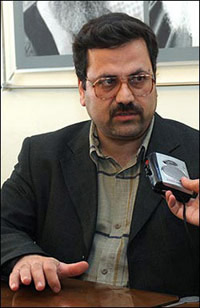Rationalization of Oral History Books (part II)
Rationalization Represents the Mastery of Compiler over Text
Akram Dashtban
Translated by: Fazel Shirzad
2018-5-29
Note: Following report is based on an invitation in which history experts are asked questions about oral history. In this regard, one of experts, as his perspective, has answered to one of questions titled "The amount of rationalization and appendix in oral history books". We'll read these comments as follows.
Mohammad Javad Moradinia, general director of Office for the Development of Books and Reading Books of the Ministry of Culture and Islamic Guidance and the director of Oral History Two-Quarterly, commented oral history site of Iran about rationalization of oral history's texts.

He spoke about the amount of rationalization and appendix in oral history books: As title showed, rationalization is an introduction of names, places, historical phenomena, the name of book, and so on, which is ambiguous to addressee, and compiler bring explanation, based on valid documentation and references, in the footnotes of book.
Moradinia continues to state that there is no different between definition of rationalization in oral memory and oral history, and added: Although this two formats are distinct in definition, author uses the technique of rationalization in the compilation of work when s/he encounter with ambiguous and unknown terms.
Saying about functions of rationalization, he added: The rationalization of text shows that the compiler of book has mastered on it and has worked hard to make the text a useful and effective one. Otherwise, it eliminates the ambiguities of text and converts a work from an early to polished one, and becomes closer to a research work.
The director of Oral History Two-Quarterly said about weak points that threatens rationalization of oral history: If a text selected for rationalization is not documented or ambiguous, it will add disadvantages to book. It is not supposed to make topics more obscure by rationalization in book. If compiler has encountered with a name in narration and cannot explain it well or does not have a reliable explanation for information which he provided, s/he only adds to shortcomings of effect.
The proper extraction of content is related to interviewer, if interviewer submits subject in ambiguous or summary terms, this is the art of interviewer to keep interview climate, hold the dialogue, then ask questions and take answers and rationalized text. It is not necessarily supposed that rationalization and explanations are brought in the text only compiler.
Moradinia explained about the amount of rationalization: The amount of rationalization should be concise and useful and should not overcome the text; a line, for example, should not be explained in twenty lines. This is the art of author and compiler to state readers, what they intended, with minimal words and sentences and does not exceed its limits.
Iranian oral history website asks question to experts about oral history, and publish responses to readers. Total responses will have remarkable results. If you have any questions, please feel free to submit it via this page to read comments from experts of oral history!
Number of Visits: 4893








The latest
Most visited
- Medal and Leave - 3
- A Statistical Glance at the Oral History Archive of Iran
- In Memory of the Son of the Soil; A Clear Picture of Patience and Freedom
- Medal and Leave - 4
- A Memory of an Army Aviation Pilot
- The 370th Night of Memories – 1
- The Oral History Website and Its Position
- Towards the Thousandth Issue
Monafeghin: A New Deception
July-August 1989Following the discussions around the asylum of Iraqi prisoners of war in Iran during peace negotiations, the Iraqi side, not wanting to fall behind, launched their own campaign to offer asylum. At the outset, they attempted to attract prisoners by making grand promises ...
Supports from Guilds and Bazaars peaple
Memoirs of Haj Hossein FathiOur base of operations had become the Saheb al-Zaman Mosque in the Kamp-Lou neighborhood of Ahvaz. With the assistance of Brother Khani and his companions, we began preparing hot meals and sending them to the frontlines. We ourselves, along with several fellow merchants from the bazaar, entered the conflict zone, bringing warm clothing, ...
War Health
Narrated by Dr. Ali Mehrabi TavanaThe book War Health is an oral narrative by Dr. Ali Mehrabi Tavana, a commander in the health sector during the Sacred Defense era. This book, in the form of six chapters and twenty conversation sessions, covers the narrator’s life from birth to the end of the [Iranian] Eight-Year War. The interviews and compilation of the book were conducted ...
Agents in Search for the Fighter
[Interview with Fatemeh Amir Hosseini 2019/03/08.] The agents were always at our house. They would come day and night, turn the house upside down, mess up the library. For example, I remember we had the book Eqtesadona (Our Economy) by Mr. Sadr, and Imam Khomeini’s Resaleh (Treatise). We had many books—they would pack some of them up and take them away. Then the next day, they would knock again. Back then, our house was on Ghiyasi Street. We were really distressed.

